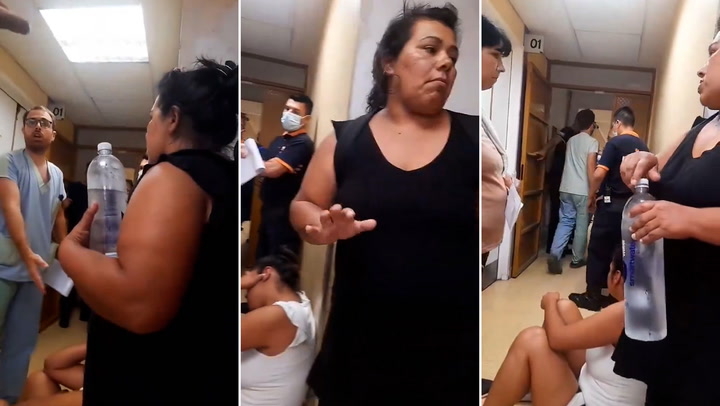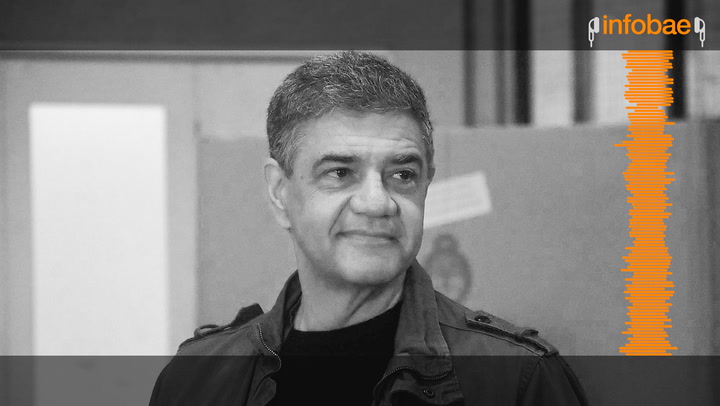briceBA
New member
The City of Buenos Aires will prioritize medical care for Buenos Aires residents in public hospitals - Infobae

Source:

 www.infobae.com
www.infobae.com
February 06, 2024
It also analyzes mechanisms to charge the government of the Province of Buenos Aires for services provided to the people of Buenos Aires. “We need them to assume their responsibility,” said Jorge Macri after a video of the Argerich guard full of people who do not live in the Capital went viral.

Video: over the weekend images of the Argerich guard full of people arriving from the province of Buenos Aires went viral
The viralization of a video of the Argerich hospital guard full of patients who arrived from the province of Buenos Aires seeking medical attention generated a new point of conflict between the Buenos Aires and Buenos Aires governments. The images exposed a situation that is not new but seems to have become more pronounced in recent months: that of many people who do not find answers in Buenos Aires public health and move to the Federal Capital to be treated, even in non-emergency situations.
The head of Government of the City of Buenos Aires, Jorge Macri, reported that they are working on a new diagnosis and care system that prioritizes Buenos Aires residents in public hospitals . In addition, they could begin to transfer the cost of consultations to the people of Buenos Aires to the government of Axel Kicillof . “We need the Province to assume its responsibility for health in its place of origin,” he said in dialogue with Marcelo Longobardi on radio Rivadavia.
“What is happening is something historic, but it is reaching its highest peak of complexity. The level of mismanagement and disinvestment in public health at the provincial level is serious. Note that most of the municipalities where they say they come from do not have municipal health. We make a great effort, but it has a limit. Our responsibility is to try to prioritize the neighbor who supports the public system,” Macri explained.
The head of Government clarified that there will be no changes in the care of people who are at risk of life or are in an emergency situation , but explained that in the majority of cases of Buenos Aires residents who cross General Paz seeking medical attention they channel through on-call situations that are not really primary care.
He also differentiated the situation of Buenos Aires residents who work and pay taxes in the Capital, who will be guaranteed public health in hospitals.
 Audio: Jorge Macri will prioritize Buenos Aires patients in public hospitals (Rivadavia)
Audio: Jorge Macri will prioritize Buenos Aires patients in public hospitals (Rivadavia)
“We've been here for four hours,” a woman can be heard saying. The doctor, completely overwhelmed by the recriminations, begins to ask them where they came from to be treated. “I come from La Plata,” says another of them. “From Florencio Varela”, “From here from Zapiola”, “From Aldo Bonzi”, “From Avellaneda”, those present continued to say.
Upon noticing these responses, the doctor was forceful in his defense: “ None of them come from La Boca. Here I serve and have a resource capacity for patients from the Federal Capital, especially from La Boca. That's why I'm overworked. “Everyone comes here ”
“I take care of who I can take care of because this oncology hospital washed its hands,” the doctor attacked in reference to an IOMA patient who presented at that Buenos Aires hospital. “The one from Avellaneda also washed his hands,” Ella added.
“So wait a little while and I'll take care of you,” the surgeon excused himself.
Towards the end of the video, when the doctor continues to give the reasons why care was delayed, people reproached him that no one had informed them that they were overwhelmed by the capacity of the guard.
“Wait for me because there isn't another one and they haven't invented the bunk bed yet. "I'll ask you for a little while and I'll take care of you," the doctor responded before returning to his office.
“So, four more hours?” , a woman replied, confused. “Or five…” the doctor doubled down as he headed to her workplace. “You are bold!” another of the women shouted indignantly, who then threatened to “burn everything.”
Official sources from the Buenos Aires government explained to Infobae that these types of situations are not new. In fact, the Ministry of Health is working to strengthen primary care through the Health and Community Action Centers (SESAC) so that residents receive care in the neighborhoods with their family doctors and not in public hospitals. “Images like those in the video are what we precisely want to avoid, the collapse of the guards,” they explained.
Historically, public health use in the city is 60/40. 60% are from Buenos Aires and 40% from other towns, the vast majority from the Buenos Aires suburbs. This index has remained relatively stable for several years, although the Buenos Aires health authorities are attentive because they believe that demand from people from other provinces could increase due to the economic situation.

Source:

La Ciudad de Buenos Aires priorizará la atención médica a los porteños en los hospitales públicos
También analiza mecanismos para cobrarle los servicios prestados a los bonaerenses al gobierno de la Provincia de Buenos Aires. "Necesitamos que asuman su responsabilidad", aseguró Jorge Macri luego de que se viralizara un video de la guardia del Argerich repleta de personas que no viven en Capital
February 06, 2024
It also analyzes mechanisms to charge the government of the Province of Buenos Aires for services provided to the people of Buenos Aires. “We need them to assume their responsibility,” said Jorge Macri after a video of the Argerich guard full of people who do not live in the Capital went viral.

Hospitales de CABA colapsados por la cantidad de pacientes que van a atenderse de la provincia de Buenos Aires
Hospitales de CABA colapsados por la cantidad de pacientes que van a atenderse de la provincia de Buenos Aires
cdn.jwplayer.com
Video: over the weekend images of the Argerich guard full of people arriving from the province of Buenos Aires went viral
The viralization of a video of the Argerich hospital guard full of patients who arrived from the province of Buenos Aires seeking medical attention generated a new point of conflict between the Buenos Aires and Buenos Aires governments. The images exposed a situation that is not new but seems to have become more pronounced in recent months: that of many people who do not find answers in Buenos Aires public health and move to the Federal Capital to be treated, even in non-emergency situations.
The head of Government of the City of Buenos Aires, Jorge Macri, reported that they are working on a new diagnosis and care system that prioritizes Buenos Aires residents in public hospitals . In addition, they could begin to transfer the cost of consultations to the people of Buenos Aires to the government of Axel Kicillof . “We need the Province to assume its responsibility for health in its place of origin,” he said in dialogue with Marcelo Longobardi on radio Rivadavia.
“What is happening is something historic, but it is reaching its highest peak of complexity. The level of mismanagement and disinvestment in public health at the provincial level is serious. Note that most of the municipalities where they say they come from do not have municipal health. We make a great effort, but it has a limit. Our responsibility is to try to prioritize the neighbor who supports the public system,” Macri explained.
The head of Government clarified that there will be no changes in the care of people who are at risk of life or are in an emergency situation , but explained that in the majority of cases of Buenos Aires residents who cross General Paz seeking medical attention they channel through on-call situations that are not really primary care.
He also differentiated the situation of Buenos Aires residents who work and pay taxes in the Capital, who will be guaranteed public health in hospitals.

Jorge Macri se refirio a la atención médica a los porteños en los hospitales públicos
Jorge Macri se refirio a la atención médica a los porteños en los hospitales públicos
cdn.jwplayer.com
A video that exposed a historical situation
This weekend a video went viral where a doctor from the Argerich Hospital had a heated dialogue with a dozen patients from Buenos Aires who showed up at the ward and complained about the slowness of care.“We've been here for four hours,” a woman can be heard saying. The doctor, completely overwhelmed by the recriminations, begins to ask them where they came from to be treated. “I come from La Plata,” says another of them. “From Florencio Varela”, “From here from Zapiola”, “From Aldo Bonzi”, “From Avellaneda”, those present continued to say.
Upon noticing these responses, the doctor was forceful in his defense: “ None of them come from La Boca. Here I serve and have a resource capacity for patients from the Federal Capital, especially from La Boca. That's why I'm overworked. “Everyone comes here ”
“I take care of who I can take care of because this oncology hospital washed its hands,” the doctor attacked in reference to an IOMA patient who presented at that Buenos Aires hospital. “The one from Avellaneda also washed his hands,” Ella added.
“So wait a little while and I'll take care of you,” the surgeon excused himself.
Towards the end of the video, when the doctor continues to give the reasons why care was delayed, people reproached him that no one had informed them that they were overwhelmed by the capacity of the guard.
“Wait for me because there isn't another one and they haven't invented the bunk bed yet. "I'll ask you for a little while and I'll take care of you," the doctor responded before returning to his office.
“So, four more hours?” , a woman replied, confused. “Or five…” the doctor doubled down as he headed to her workplace. “You are bold!” another of the women shouted indignantly, who then threatened to “burn everything.”
Official sources from the Buenos Aires government explained to Infobae that these types of situations are not new. In fact, the Ministry of Health is working to strengthen primary care through the Health and Community Action Centers (SESAC) so that residents receive care in the neighborhoods with their family doctors and not in public hospitals. “Images like those in the video are what we precisely want to avoid, the collapse of the guards,” they explained.
Historically, public health use in the city is 60/40. 60% are from Buenos Aires and 40% from other towns, the vast majority from the Buenos Aires suburbs. This index has remained relatively stable for several years, although the Buenos Aires health authorities are attentive because they believe that demand from people from other provinces could increase due to the economic situation.

